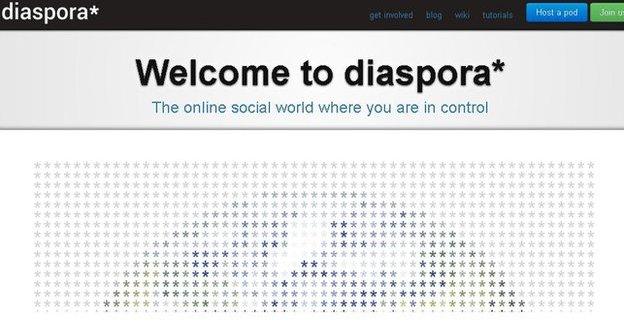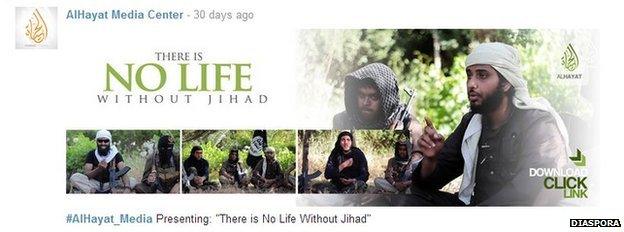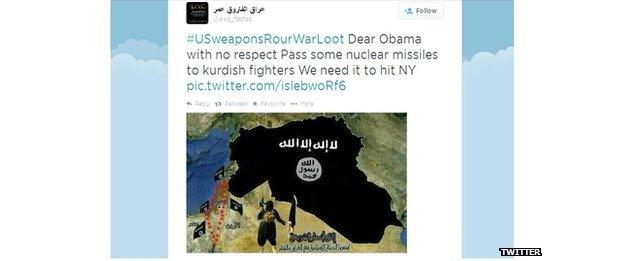Islamic State shifts to new platforms after Twitter block
- Published

A sustained clampdown on the Twitter presence of Islamic State (IS) has forced the hardline jihadist group to explore less well-known social media platforms like the privacy-focused Diaspora, which was used to disseminate the video of US journalist James Foley's killing.
Since IS began a series of spectacular land-grabs in Iraq in June, a long list of Twitter accounts run by the group have been shut down - apparently in response to the widely-acknowledged success of its social media offensive.
The Twitter squeeze intensified last week - coinciding with mounting international pressure on the group - when back-up IS accounts were being taken down almost as soon as they were being launched.

IS has used its Diaspora account for Nineveh Province to promote its activities
Appearing to give up on Twitter, IS then launched a string of accounts on Diaspora relaying news from its various "provinces" in Iraq and Syria. But these too disappeared within hours of the James Foley video being released, leaving the group with no official social media outlet.
Despite the pressure on its media operation, IS has always proved highly resilient and adaptable. As well as seeking out alternative platforms, the group has been able to rely on a huge army of supporters to give its propaganda wider circulation on Twitter, YouTube and other social media.
IS first experimented with Diaspora around a month ago, setting up accounts there for its central media wing, al-Itisam, and its multilingual media outfit, al-Hayat Media Center, after they were evicted from Twitter.
Around the same time, IS launched accounts on two other marginal social media platforms - Friendica and Quitter - both of which also claim a greater emphasis on privacy and data protection than Twitter.

Al-Hayat Media Center uses Diaspora to promote high profile foreign-language videos
But the IS accounts there soon suffered the same fate as on Twitter, while its presence on Diaspora endured for nearly a month before the Foley video prompted the site to take action.
Diaspora is a decentralised online social network, started with crowdfunding by four New York students in 2010. It relies on its users to set up communities on their own servers or "pods" using the Diaspora software.
As such, it does not operate through a central website, but through a series of interconnected sites whose members can interact with accounts on other pods. IS chose to set up shop on one of the most active pods, hosted in the US.
The loss of Twitter and Diaspora as a place where IS can publish material directly is a blow for the group. But it may only be temporary and has not prevented it from spreading its message.
The group has thousands of supporters on Twitter who are actively amplifying its message, rallying support and waging psychological warfare. During the Brazil 2014 World Cup, for example, they hijacked popular football hashtags to broaden the reach of the IS message.

Twitter was used by IS supporters to mock Western efforts to aid its enemies
Their latest campaign, primarily in English, has been aimed at taunting the West - sometimes with black humour, sometimes with gruesome imagery - warning that any weapons sent to the aid the Kurds in their offensive against IS would end up in IS hands.
BBC Monitoring, external reports and analyses news from TV, radio, web and print media around the world. For more reports from BBC Monitoring, click here. You can follow BBC Monitoring on Twitter, external and Facebook, external.